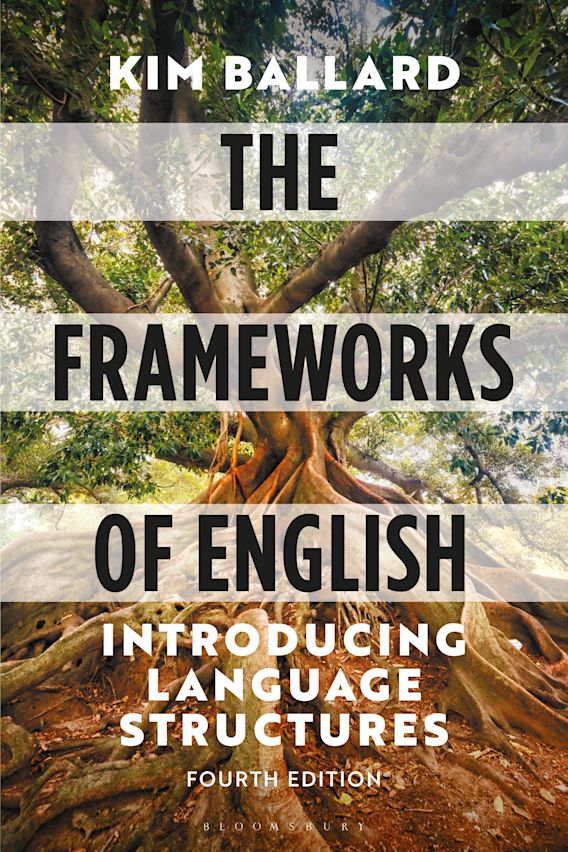


Are you sure you want to reset the form?
Your mail has been sent successfully
Are you sure you want to remove the alert?
Your session is about to expire! You will be signed out in
Do you wish to stay signed in?
Question 1 (Consolidate)
For each of the following compounds, identify the word class of the compound as a whole, and then the word classes of the elements that form it:
everybody, eye-opener, greenhouse, happy-sad, hearsay,
name-drop, pick-me-up, raincoat, raspberry, with-profit
Answer
| word class of compound | word classes of its elements | |
| everybody | pronoun | determiner + noun |
| eye-opener | noun | noun + noun |
| greenhouse | noun | adjective + noun |
| happy-sad | adjective | adjective + adjective |
| hearsay | noun | verb + verb |
| name-drop | noun and verb | noun + verb |
| pick-me-up | noun | verb + pronoun + adverb |
| raincoat | noun | noun + noun |
| raspberry | noun | noun + noun |
| with-profit | adjective | preposition + noun |
Question 2 (Consolidate)
In Section 3.6 we looked at combining forms, which provide a very productive means of creating new words. New combining forms often appear as borrowed elements from existing words. Identify the combining form that has been created from each of the following words, and add some examples of words formed using that combining form:
alcoholic, broadcast, digital, Godzilla, Watergate
Answer/discussion
| alcoholic | -(o)holic | newsaholic, sugarholic, workaholic |
| broadcast | -cast | podcast, simulcast |
| digital | digi- | digibox, digicam |
| Godzilla | -zilla | bridezilla, Chipzilla |
| Watergate | -gate | biscuitgate, examgate, partygate, pizzagate |
Although you may already be familiar with these combining forms, you may have had difficulty thinking of examples for some of them. This is because new usages often have a fairly short lifespan. For instance, since -gate is used to form a nickname for some kind of scandalous incident, that name often gets forgotten as soon as the incident is no longer in the news. The combining form -zilla tends to have spontaneous, one-off uses, although some formations become established in the lexicon.
Question 3 (Explore)
We saw in Section 3.10 that there’s a wide variety of meaning relations between the two elements of compound words. Here are some further examples of compound nouns (all noun + noun combinations). For each example, express the relationship between the two elements, either as an x/y relationship (for instance, bookcase is ‘y is for x’) or in any other way that seems appropriate. What problems do you encounter, and which of the words seem least transparent in terms of their meaning?
birdsong, boot camp, brain damage, eyeball, homework, lemon curd, log cabin, raincoat, streetlight, summerhouse, witch-hunt
Answer/discussion
| x/y relationship | further interpretation / comment | |
| birdsong | y is produced by x | |
| boot camp | ? | boot camp is mainly used figuratively (‘boots’ was a nickname for trainee soldiers) |
| brain damage | y is located in x | (by implication) y has affected x |
| eyeball | xy is x | x is the shape of y or xy is the shape of y |
| homework | y is done at x | (by implication) y is not done at school |
| lemon curd | y is made from x | y tastes of x, y is mainly made from x |
| log cabin | y is made from x | y is made from more than one x |
| raincoat | y is a protection from x | |
| streetlight | y is located in x | the purpose of y is to illuminate x |
| summerhouse | y is for use in x | xy is often a small version (of y) xy doesn’t have to be used only in x |
| witch-hunt | y is directed at x | x is usually taken to be plural (hunting for witches) xy is mainly used figuratively |
The examples illustrate the complexity of compound meanings. As you can see, there is a wide range of different relationships between x and y. Some meanings seem comparable – for example, both streetlight and brain damage are locational – but the nuances of meaning differ. The figurative example boot camp is particularly difficult to explain without knowing its origin. Most of the above examples can also be described in terms of ‘xy is a type of y’, reflecting the fact that many compound nouns belong in hyponymic groups: for instance, streetlight, moonlight and candlelight are all hyponyms of light.

.